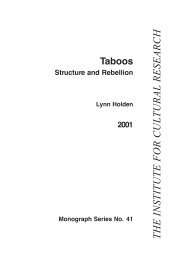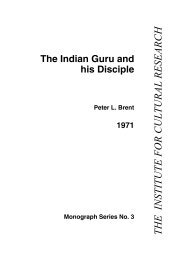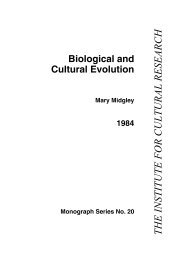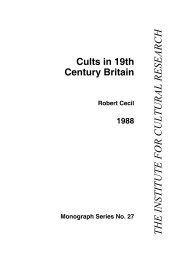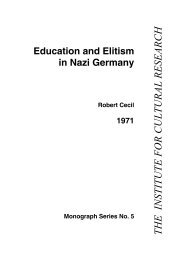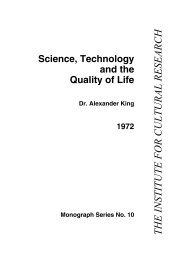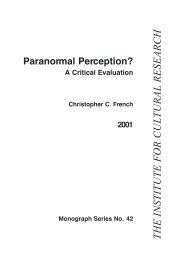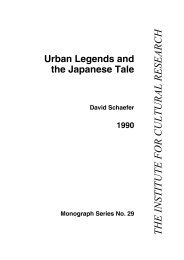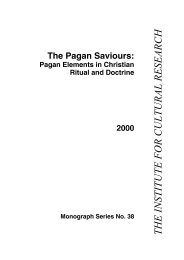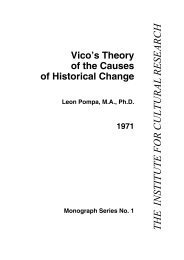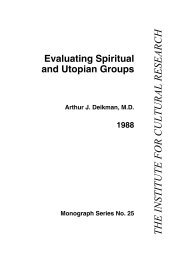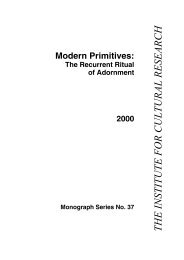Cultural Identity: Solution or Problem - The Institute For Cultural ...
Cultural Identity: Solution or Problem - The Institute For Cultural ...
Cultural Identity: Solution or Problem - The Institute For Cultural ...
Create successful ePaper yourself
Turn your PDF publications into a flip-book with our unique Google optimized e-Paper software.
exploitation has tended to penetrate m<strong>or</strong>e decisively into these<br />
areas. Perhaps m<strong>or</strong>e significant, however, has been the wave of<br />
post-war decolonisation in which colonial empires finally broke up,<br />
giving previously dependent peoples a sense of their own destiny<br />
and independence in the w<strong>or</strong>ld. In fact, such decolonisation in some<br />
cases proved troublesome f<strong>or</strong> tribal peoples who found themselves<br />
straddling new national b<strong>or</strong>ders and subjected to attempts at control<br />
from m<strong>or</strong>e than one newly independent government.<br />
But this type of <strong>or</strong>ganisation, seeking redress, rights and a selfconscious<br />
cultural identity is not limited to ‘Fourth W<strong>or</strong>ld’ peoples.<br />
In the USA, black people – <strong>or</strong> African Americans, to use a m<strong>or</strong>e<br />
current term – already had long traditions of <strong>or</strong>ganisation, both<br />
inf<strong>or</strong>mal and f<strong>or</strong>mal. 5 <strong>The</strong> National Association f<strong>or</strong> the<br />
Advancement of Coloured People, f<strong>or</strong> example, was founded in<br />
1909; the United Negro Improvement Association, although<br />
founded in Jamaica by Marcus Garvey in 1914, also had a maj<strong>or</strong><br />
impact in the USA, not to mention the entire Caribbean basin. But it<br />
was the post-war civil rights movement, associated with Martin<br />
Luther King, and the later Black Power movement that had the<br />
greatest influence and also provided models f<strong>or</strong> black consciousness<br />
and struggles against racism and f<strong>or</strong> ‘black pride’ f<strong>or</strong> the<br />
descendants of Africans all over the Americas. Malcolm X became<br />
a hero figure f<strong>or</strong> many black people in Brazil, Colombia and all over<br />
the Caribbean. 6 In the USA, the trend towards ethnic and racial selfconsciousness<br />
was officially recognised in 1970 when the Census<br />
Bureau adopted a categ<strong>or</strong>isation that divided the population into five<br />
basic groups: African, Anglo, Hispanic, Asian and Native.<br />
In the UK, and in much of the rest of Europe, there has also been<br />
a surge of ethnic and racial consciousness and <strong>or</strong>ganisation,<br />
deriving mainly from currents of immigration from f<strong>or</strong>mer colonies<br />
into the metropoli. In the UK, this has resulted in concerns about<br />
cultural identity not only f<strong>or</strong> Afro-Caribbean and Asian immigrants,<br />
but f<strong>or</strong> the British as well (<strong>or</strong> m<strong>or</strong>e precisely the English, Welsh,<br />
Scots and Irish). In some ways fears about immigration – actually,<br />
fears about ‘coloured’ immigration, since a maj<strong>or</strong>ity of Britain’s<br />
post-war immigrants have been white – have channelled concerns<br />
about the decline of Britain as a whole, its loss of w<strong>or</strong>ld power,<br />
its decline as an imperial nation, its possible abs<strong>or</strong>ption into<br />
Europe and so on. Gilroy (1987, 1993) argues that this sense of<br />
5



